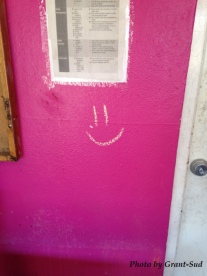A beautiful day in the Old Town, or what remained of it.
The buildings that had stood for centuries were now reduced to rubble.
As Farouk walked through the cluttered streets there were signs of life re-emerging. Children’s voices could be heard. Groups of people gathered and gossiped as they had done before the war.
The occupying forces had left. The time of immediate danger was over.
The chalk sign on the door to his house had been a surprise. Two dashes with a curve – meet at midday in the main square cafe.
He had thought all the international agencies had left the country.
A last farewell perhaps, maybe a final reward for the information Farouk had provided over the years.
The table they usually met at was unoccupied. A piece of paper was lying on it.
His stomach lurched.
In Arabic letters it read: ‘Do you know the price of treason?’
The world went dark as a black bag smothered Farouk’s face.
Passersby carried on walking. They had learned to look the other way.

Written as part of Flash Fiction for Aspiring Writers. The challenge is to write a flash fiction story in around 150 words, based on the weekly photo prompt. Thanks as always to the challenge host Priceless Joy. For more information visit HERE.
To read other stories based on this week’s prompt, visit HERE.

Leave a comment